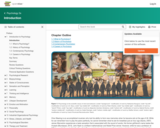
test resource
- Subject:
- Psychology
- Social Studies
- Material Type:
- Textbook
- Author:
- Kristin Lansdown
- Date Added:
- 12/29/2020

test resource
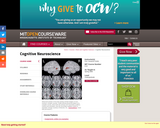
This course explores the cognitive and neural processes that support attention, vision, language, motor control, navigation, and memory. It introduces basic neuroanatomy, functional imaging techniques, and behavioral measures of cognition, and discusses methods by which inferences about the brain bases of cognition are made. We consider evidence from patients with neurological diseases (Alzheimer's disease, Parkinson's disease, Huntington's disease, Balint's syndrome, amnesia, and focal lesions from stroke) and from normal human participants.
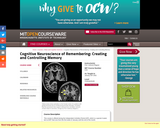
For undergraduates taking Course 9 IAP subjects for credit. See IAP Guide for details.
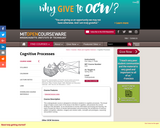
An introduction to human information processing and learning; topics include the nature of mental representation and processing; the architecture of memory; pattern recognition; attention; imagery and mental codes; concepts and prototypes; reasoning and problem solving.
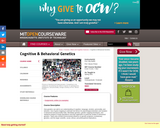
How genetics can add to our understanding of cognition, language, emotion, personality, and behavior. Use of gene mapping to estimate risk factors for psychological disorders and variation in behavioral and personality traits. Mendelian genetics, genetic mapping techniques, and statistical analysis of large populations and their application to particular studies in behavioral genetics. Topics also include environmental influence on genetic programs, evolutionary genetics, and the larger scientific, social, ethical, and philosophical implications.
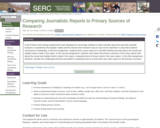
A set of three short writing assignments were designed to encourage students to think critically about the way that scientific research is reported by the popular media and the reasons that research may or may not be reported in a way that could be construed as misleading.
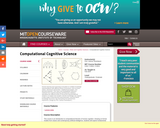
This course is an introduction to computational theories of human cognition. Drawing on formal models from classic and contemporary artificial intelligence, students will explore fundamental issues in human knowledge representation, inductive learning and reasoning. What are the forms that our knowledge of the world takes? What are the inductive principles that allow us to acquire new knowledge from the interaction of prior knowledge with observed data? What kinds of data must be available to human learners, and what kinds of innate knowledge (if any) must they have?

This developmental psychology textbook includes chapters on introduction to lifespan development and theories, prenatal and infant development, early childhood, middle childhood, adolescence, early adulthood, middle adulthood, late adulthood and end of life.

The goal of this lesson developed by Pacer's National Bullying Prevention Center is to help elementary-age students understand what bullying is and the role they can plan in stopping it. It includes a detailed lesson plan as well as links to video segments which may be useful. It also includes scenarios that students could role play as they consider how they might act in stopping bullying.
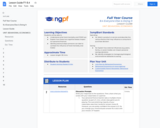
Estimated Lesson Time:
Students will be able to:
-Understand what herd mentality and FOMO are
-Explain how these two cognitive biases impact our personal finances
-Identify practical steps someone can take to combat the influence of herd mentality and FOMO
ANSWER KEY LINKS: Create a Next Gen Personal Finance (NGPF) account to access answer keys. They will be listed under the Full Year Curriculum tab.
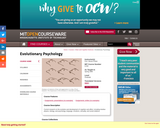
Current research on the evolution and development of cognition and affect, including intuitive physics, biology, and psychology, language, emotions sexuality, social relations.

This assignment ties thematically into texts concerning Mob Mentality, Cliques, and Groupthink. Students are asked to evaluate the psychology behind groupthink and relate it to written and world texts they have encountered.
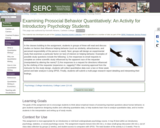
For this psychology project, students in small groups will design and execute a study on helping behavior and then analyze and interpret the results.

Experimental Methods of Adjustable Tetrode Array Neurophysiology
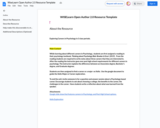
The purpose of this lesson is to help students explore what their chosen field of study has to offer using lecture notes, Xello career program, and a guest speaker. The lesson focus is on Psychology, but it doesn’t have to be. This lesson would take 3 class periods.
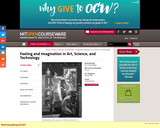
Seminar on the creativity in art, science, and technology. Discussion of how these pursuits are jointly dependent on affective as well as cognitive elements in human nature. Feeling and imagination studied in relation to principles of idealization, consummation, and the aesthetic values that give meaning to science and technology as well as literature and the other arts. Readings in philosophy, psychology, and literature.

This event occurs every February at Oconomwoc High School. The goal of the event is to raise money for Children's Hospital behavioral and mental health programs, to reduce the stigma around talking about mental health, and to provide students with opportunities to explore careers in the mental health field.
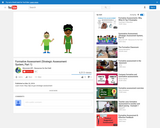
Educators use formative assessment to continually reflect and improve their skills related to these practices. The Formative Assessment video is a resource that can be used to support educators' professional development related to assessment literacy. Use the Video Supplement & Resource Guide to enhance your facilitation of this professional development opportunity.
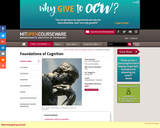
Advances in cognitive science have resolved, clarified, and sometimes complicated some of the great questions of Western philosophy: what is the structure of the world and how do we come to know it; does everyone represent the world the same way; what is the best way for us to act in the world. Specific topics include color, objects, number, categories, similarity, inductive inference, space, time, causality, reasoning, decision-making, morality and consciousness. Readings and discussion include a brief philosophical history of each topic and focus on advances in cognitive and developmental psychology, computation, neuroscience, and related fields. At least one subject in cognitive science, psychology, philosophy, linguistics, or artificial intelligence is required. An additional project is required for graduate credit.
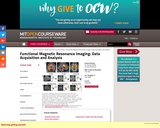
" This team-taught multidisciplinary course provides information relevant to the conduct and interpretation of human brain mapping studies. It begins with in-depth coverage of the physics of image formation, mechanisms of image contrast, and the physiological basis for image signals. Parenchymal and cerebrovascular neuroanatomy and application of sophisticated structural analysis algorithms for segmentation and registration of functional data are discussed. Additional topics include: fMRI experimental design including block design, event related and exploratory data analysis methods, and building and applying statistical models for fMRI data; and human subject issues including informed consent, institutional review board requirements and safety in the high field environment. Additional Faculty Div Bolar Dr. Bradford Dickerson Dr. John Gabrieli Dr. Doug Greve Dr. Karl Helmer Dr. Dara Manoach Dr. Jason Mitchell Dr. Christopher Moore Dr. Vitaly Napadow Dr. Jon Polimeni Dr. Sonia Pujol Dr. Bruce Rosen Dr. Mert Sabuncu Dr. David Salat Dr. Robert Savoy Dr. David Somers Dr. A. Gregory Sorensen Dr. Christina Triantafyllou Dr. Wim Vanduffel Dr. Mark Vangel Dr. Lawrence Wald Dr. Susan Whitfield-Gabrieli Dr. Anastasia Yendiki "